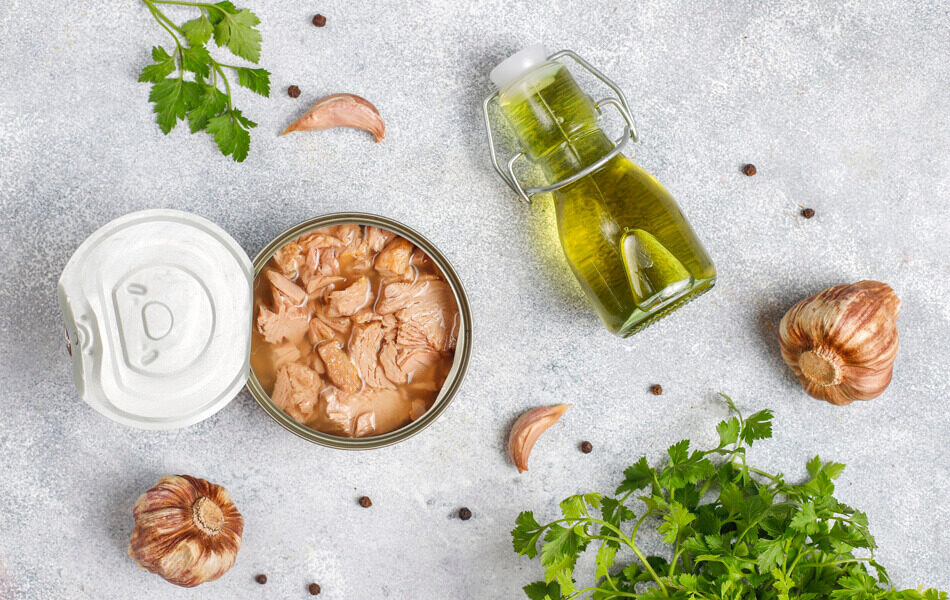Is Canned Salmon Healthy? Nutrition, Calories
Canned salmon is a popular canned fish product that appears to be a healthy and convenient protein source. However, is it too good to be true?

Are you looking for a simple and nutritious salmon option that is ready-made and inexpensive? Do you dread preparing and cooking fresh salmon and need a quicker choice?
Canned salmon is a versatile fish product that has many wondering about its health implications. It is similar to canned tuna in its packaging and is perfect for making a salmon salad. Read on to learn more about canned salmon!
Is Canned Salmon a Healthy Food?
Canned salmon is a healthy protein source rich in vitamins, minerals, and healthy fatty acids and low in carbohydrates and sugar. However, many canned salmon brands contain significant amounts of cholesterol and sodium. Therefore, consume canned fish in moderation.
Is Canned Salmon Cooked?
Canned salmon is fully cooked and is technically ready to eat, just like canned tuna. You can add canned salmon to a salmon salad, similar to a tuna salad. However, many prefer to heat it and serve it with some vegetables, noodles, or rice.
There is no need to freeze canned salmon as it is shelf-stable and can safely last in your pantry for years.
What Are the Health Benefits of Canned Salmon?
Canned salmon is a canned fish that is rich in omega-3 fatty acids, which are essential in our diet to survive. Omega-3s are called polyunsaturated fats and come in two main forms.
The two kinds of omega-3 fatty acids found in fish are EPA, or eicosapentaenoic acid, and DHA, or docosahexaenoic acid.
According to the Cleveland Clinic, consuming adequate amounts of omega-3 fatty acids in your diet supports a healthy heart and reduces the risk of cardiovascular disease, including heart attack, stroke, and atherosclerosis.
Omega-3 fatty acids can help lower blood pressure, decrease the risk of blood clotting, and reduce arterial inflammation in the body.
Salmon is amongst the highest fish sources of omega-3 fatty acids and is an excellent addition to a healthy diet.
The American Heart Association recommends consuming two servings of fatty fish (including salmon) weekly as fish is a good source of omega-3 fatty acids and unsaturated fats while low in saturated fat.
What Ingredients Does Canned Salmon Contain?
Besides the salmon itself, the only other ingredient in canned salmon is just salt. But, of course, the exact type of salmon, such as farmed salmon, wild-caught, or even Alaskan pink salmon.
Due to the salt added during commercial processing, a 100g serving of canned salmon can have as much as 400mg of sodium.
The 2020–2025 Dietary Guidelines for Americans recommend no more than 2,300mg of sodium per day. A high-sodium food, such as canned salmon, should be consumed in moderation.
Nutrition Facts
Canned salmon is a delicious canned fish product filled with nutrition. So let’s dive into it!
Nutrition table (per 100g)
| Calories/Nutrient | Amount |
| Calories (kcal) | 129 |
| Net Carbs (g) | 0 |
| Fats (Total) | 4.97 |
| Protein (g) | 19.7 |
| Cholesterol (mg) | 55 |
| Sodium (mg) | 403 |
Source: https://fdc.nal.usda.gov/fdc-app.html#/food-details/173690/nutrients
High in vitamins and minerals
Salmon is rich in many vitamins and minerals, especially B vitamins and selenium. Whether it is fresh fish such as wild-caught salmon or if you choose canned salmon, it is very nutritious. Let’s dive into some of the key players!
Salmon is rich in vitamin B12, also known as cobalamin. According to the Mayo Clinic, vitamin B12 is essential for metabolism, nervous system functioning, red blood cell formation, and more.
Similarly, canned salmon contains significant amounts of niacin or vitamin B3. Per the National Institutes of Health, niacin also plays a vital role in metabolism.
In other words, niacin helps the body turn the food we eat into energy the body can use to operate.
Finally, selenium is a mineral needed in the body to create DNA, or genetic material, and protects cells from damage and infection (Harvard School of Public Health).
High in protein
Besides being tasty and convenient, canned salmon is an excellent source of dietary protein. A 100g serving of canned salmon has a whopping 19.7g of protein!
For reference, that is about a fourth of a typical-sized can of salmon.
According to the National Library of Medicine, protein is needed to produce and maintain muscles and bones in the body. In addition, proteins are an essential part of every chemical reaction in the body.
Add a scoop of salmon salad as the protein on top of a sandwich for a balanced meal.
Low in fats and calories
Canned salmon is considered a high-fat fish because of its high omega-3 fatty acid content mentioned above. However, it is low in unhealthy fats such as saturated fat.
For example, canned and fresh salmon have less saturated fat and practically just as much protein as beef or pork.
Eating too much saturated fat can increase your risk for heart disease, including heart attack and stroke.
Additionally, a 100g serving of canned salmon (approximately a fourth of the can) only contains 129 calories.
Read more about salmon for weight loss here.
High in cholesterol
Cholesterol is naturally produced in the body; therefore, it is not essential to get it from our diets. However, animal products contain cholesterol – for example, a 100g serving of canned salmon contains 55mg of cholesterol.
While the recommendation was previously to consume no more than 200–300mg of cholesterol per day, the 2020–2025 Dietary Guidelines for Americans now encourage eating as little cholesterol as possible.
Therefore, cholesterol is another reason to consume canned salmon (or even wild-caught or fresh fish) in moderation and alternate with plant protein sources.
FAQs
Yes, it is safe to eat the bones in canned salmon as they are softened during processing.
Yes, canned salmon is fully cooked and is safe to eat, similar to canned tuna. Try it atop a salad, on a sandwich, or in a soup!
While canned salmon contains the same vitamins and minerals as fresh salmon, it does have more sodium from commercial processing. High sodium intake can increase the risk of heart disease.
A Word From a Dietitian
Canned salmon is an excellent source of healthy fats and protein in a way that is also inexpensive, convenient, and tasty!
You can use this canned fish in endless ways, from a salmon salad to sandwiches to soups and more. It can be consumed hot or cold, according to your preferences.
Canned salmon contains vitamins and minerals, including vitamin B12 and selenium.
However, it is essential to note that canned salmon contains high amounts of sodium, which can increase your risk of heart disease.
Consume canned salmon in moderation, alternating with other protein sources, such as lean poultry, fresh fish, and plant protein.
Conclusion
Overall, canned salmon is an excellent addition to your pantry staples to pull out when you are in a time crunch or are looking for a quick and easy meal. Whether wild-caught, red salmon, Atlantic salmon, and more, canned salmon is a healthy canned seafood product to have in your diet.

















































 Select your language:
Select your language: 








